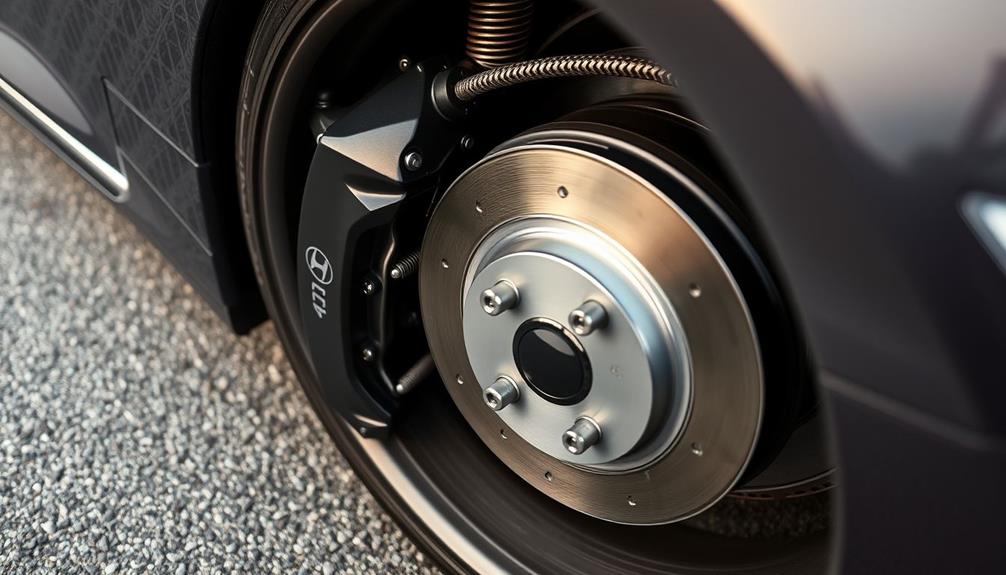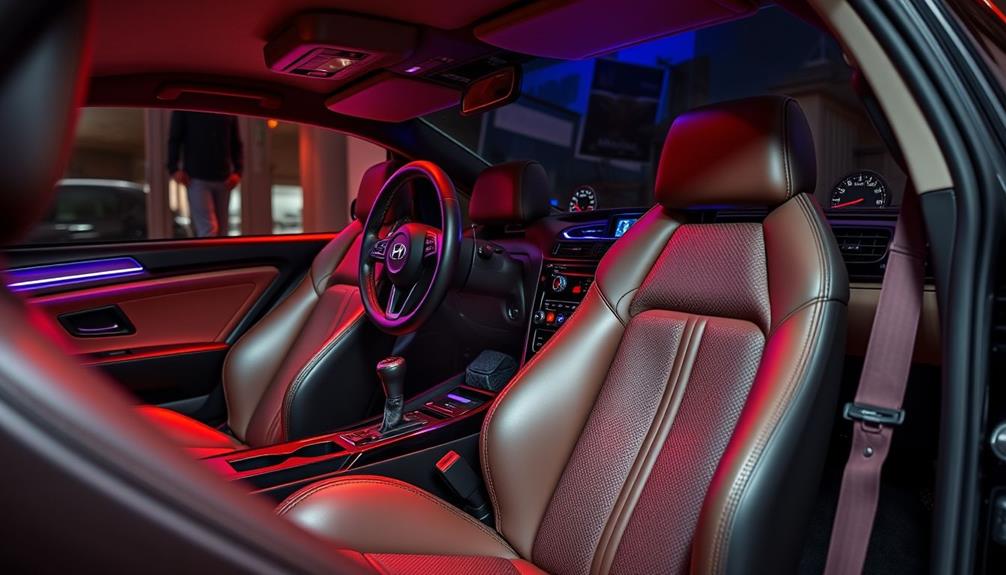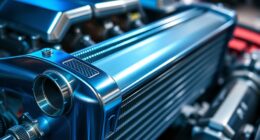Tuning your Hyundai Sonata is a great way to boost performance. You can gain up to 10 horsepower and 7 lb-ft of torque with simple modifications. Start with a K&N air filter and cold air intake for better airflow. Upgrading to a 3-inch exhaust system enhances sound and efficiency. Don't forget about the importance of throttle response—installing an electronic throttle controller makes a noticeable difference. While costs vary, expect to invest around $500-$700 for chip tuning and supporting mods. If you're enthusiastic to access even more potential, there's plenty more to explore about suspension and braking upgrades!
Key Takeaways
- Tuning the 2.4L GDI engine can increase power by up to 10 horsepower and 7 lb-ft of torque.
- Essential modifications include upgrading the exhaust system, installing a K&N air filter, and a custom ECU reflash.
- Improving throttle response can be achieved with electronic throttle controllers and larger throttle bodies.
- Braking system upgrades, like big brake kits, enhance stopping power and safety for high-performance driving.
- Community forums provide valuable resources and support for DIY enthusiasts during the tuning process.
Performance Gains Overview
When you tune a stock 2.4L GDI engine in your Hyundai Sonata, you can expect a noticeable boost in performance. By optimizing the engine, you could see an increase of roughly 10 horsepower and 7 lb-ft of torque, pushing your output to about 180 horsepower and 175 lb-ft of torque.
Simple performance upgrades can elevate non-turbo models to over 200 horsepower, making your Sonata feel more powerful and responsive.
Consider porting and polishing the engine head; this can yield up to 30 additional horsepower. Just be cautious not to overspend on aggressive porting techniques.
Installing a K&N air filter and air intake system will also help improve performance, enhancing both throttle response and overall efficiency.
If you're looking for even more power, advanced tuning options like a T4 Turbo kit can greatly boost your engine's output, although it comes with a hefty price tag of around $5,000.
Essential Modifications for Tuning

To access the full potential of your tuned Hyundai Sonata, consider a range of modifications that can elevate performance further. One option to consider is upgrading to a high-performance exhaust system, which can improve the flow of exhaust gases and increase horsepower. Additionally, investing in a quality cold air intake can maximize the amount of air reaching the engine, resulting in improved combustion and acceleration. For more specific recommendations and tips on tuning your Hyundai Sonata or related models, be sure to consult the kia forte tuning guide for expert advice and step-by-step instructions.
Upgrading to a 3-inch exhaust system with a resonator delete and Hooker mufflers not only enhances the sound but also improves exhaust flow, which contributes to better engine performance.
Installing a K&N air filter along with a Cold Air Intake system can greatly enhance air intake efficiency, potentially boosting horsepower.
Additionally, lightweight pulleys and larger throttle bodies are simple yet effective modifications that can improve acceleration and overall engine performance, typically costing between $400 and $500.
If you're looking for a more dramatic improvement, porting and polishing the engine head can yield a substantial horsepower gain of up to 30 horsepower, though you should approach this with caution to avoid excessive costs.
Lastly, utilizing electronic throttle controllers such as the TROS Potent Booster or Pedal Commander can markedly enhance your throttle response, improving your overall driving experience without directly impacting horsepower or torque.
Each of these essential modifications can help you get the most out of your Hyundai Sonata.
Enhancing Throttle Response

Enhancing throttle response is essential for transforming your driving experience with the Hyundai Sonata. When you improve throttle response, you get a more engaging and responsive feel, especially during everyday driving.
One effective way to achieve this is by installing electronic throttle controllers like the TROS Potent Booster or Sprint Booster. These devices adjust gas pedal voltage, enhancing sensitivity without directly boosting horsepower or torque.
Another great option is the Pedal Commander, which can further elevate your throttle response, making your driving feel more connected.
If you're looking for a more thorough approach, consider a custom ECU reflash from Shark Racing. This performance modification can greatly improve throttle response alongside overall vehicle performance.
Additionally, upgrading to a larger throttle body can enhance airflow, further contributing to improved throttle response. This upgrade complements other performance modifications and is especially beneficial for non-turbo models, which rely more on drivability and acceleration.
Cost of Modifications

When you're planning upgrades for your Hyundai Sonata, it's essential to budget not just for the parts but also for installation expenses.
Keep in mind that while some modifications can be affordable, others can greatly impact your wallet.
Evaluating the long-term value of these changes versus the cost of buying a faster model can help you make a smart decision.
Budget for Upgrades
Budgeting for upgrades on your Hyundai Sonata can be an essential step in maximizing its performance. Understanding the costs associated with high-quality modifications helps you plan effectively.
Here's a breakdown of potential expenses you might encounter:
- Chip tuning & supporting modifications: $500 – $700
- Cams and pulleys: an additional $400 – $500
- T4 Turbo kit: approximately $5,000 for significant power increase
- Exhaust headers: $200 – $300 for basic upgrades
- Power tune module installation: about $80, adding 10-15 extra horsepower
Planning your budget for upgrades not only prepares you for the initial investments but also helps you consider the potential resale value of original parts.
Many modifications can be resold, particularly if you trade in at a Hyundai dealership, potentially offsetting some costs.
Keep in mind that high-quality upgrades can make a noticeable difference in your Sonata's performance, ensuring you get the most bang for your buck.
Prioritize your upgrades based on your performance goals and budget, and you'll see the best results.
Installation Expenses Overview
Installing performance modifications on your Hyundai Sonata can come with varying costs, depending on the complexity and type of upgrades you choose. To help you understand these installation expenses, here's a breakdown of common modifications:
| Modification Type | Estimated Cost |
|---|---|
| Power tune module | $80 |
| Chip tuning & enhancements | $500 – $700 |
| Cams and pulleys | $400 – $500 |
| T4 Turbo kit | $5,000 |
| Miscellaneous upgrades | Varies |
Simple modifications like a power tune module are budget-friendly and easy to install. However, if you're looking for more significant performance upgrades, chip tuning and supporting modifications can be a bit pricier. Cams and pulleys also add to your installation expenses, while a T4 Turbo kit represents a more substantial investment.
Keep in mind that these costs can add up quickly, so it's important to plan your budget accordingly. Ultimately, the right modifications can enhance your Sonata's performance, but knowing the installation expenses upfront will help you make informed decisions.
Long-Term Value Assessment
Evaluating the long-term value of modifications on your Hyundai Sonata is essential for making informed decisions about your investment. While performance upgrades can provide significant horsepower gains, it's vital to take into account the overall costs and potential returns.
Here are some factors to keep in mind during your long-term value assessment:
- Initial Costs: Tuning modules can range from $300 to $800, with installation adding another $400 to $500.
- Substantial Upgrades: For major modifications like performance chips, you might spend over $1,500 to achieve notable enhancements.
- Turbo Kits: Upgrading to a T4 Turbo kit can cost around $5,000, so weigh the performance boost against buying a faster vehicle.
- Fuel Efficiency: Improved tuning can lead to savings on fuel, which helps offset your overall costs.
- Resale Value: Retaining original parts may allow for higher trade-in values at dealerships, potentially recovering some of your investment.
Community Resources and Support

Community support is invaluable for Hyundai Sonata enthusiasts looking to enhance their vehicles through tuning. The Hyundai Forum serves as a collaborative platform where you can share your experiences, results, and recommendations for performance tuning modifications on the Sonata. Here, members frequently discuss horsepower figures, performance expectations, and the importance of reliability, especially for non-turbo models.
If you're a DIY enthusiast, community support is readily available, providing advice on upgrades and troubleshooting during the modification process. Engaging with fellow members not only helps you tackle challenges but also fosters a sense of camaraderie among tuners.
Users often emphasize the significance of documenting modifications and their outcomes, which contributes valuable insights to the collective knowledge base of the forum.
Moreover, you'll find tips on maintenance and best practices to guarantee your vehicle's longevity post-tuning. By actively participating in these discussions, you can gain knowledge and confidence in your tuning journey.
Suspension Upgrades for Performance

Performance tuning isn't just about boosting horsepower; it also involves refining your vehicle's handling dynamics.
Investing in suspension upgrades is essential for enhancing your Hyundai Sonata's performance and ensuring a thrilling driving experience. One of the best options available is performance coilovers, which allow you to adjust ride height, spring preload, and damping. This customization greatly improves cornering capabilities and reduces body roll.
Consider these key suspension upgrades:
- Performance coilovers for adjustable ride height and damping
- Monotube design for better responsiveness and heat dissipation
- Air suspension systems with 36 levels of damping adjustment
- Sway bars to minimize understeer and enhance stability
- Adjustable endlinks to maintain ideal preload
Improving Braking Systems

Upgrading your braking system is just as essential as enhancing your suspension for performance.
Big brake kits can greatly boost your stopping power, especially during intense driving conditions.
Plus, with straightforward installation and regular maintenance, you can guarantee your Sonata stays safe and responsive on the road.
Importance of Brake Upgrades
When it comes to enhancing your Hyundai Sonata's capabilities, improving the braking system is one of the most essential upgrades you can make. Upgrading your brakes not only improves performance but also guarantees your safety, especially when you've added horsepower.
High-performance builds demand a braking system that can handle increased speeds and stress.
Consider these key points for brake upgrades:
- Better Stopping Power: Upgrading to a big brake kit, like the 15-18 rear kit with 6-piston calipers and 380 mm drilled rotors, enhances stopping efficiency.
- Durability: The 11-14 front kit features 8-piston calipers and 356 mm slotted rotors, designed for high-heat conditions.
- Safety: Regularly assess your brake pads and components, especially after modifications.
- Ease of Installation: Both big brake kits are designed for simple installation with minimal tools.
- Compatibility: These kits are suitable for 2WD vehicles, making them accessible for performance enthusiasts.
Big Brake Kit Benefits
How can a big brake kit transform your Hyundai Sonata's driving experience? By greatly enhancing your vehicle's stopping power, these kits boost safety, especially when you're pushing your Sonata to higher speeds. For high-performance builds, the benefits are essential.
Take the 15-18 Hyundai Sonata Rear Big Brake Kit, for instance. With lightweight aircraft-grade aluminum calipers and a 6-piston design, it excels in high-heat conditions, preventing brake fade when you need it most. The 380 mm drilled rotors guarantee efficient heat dissipation, allowing you to drive aggressively without compromising performance.
On the front, the 11-14 Hyundai Sonata Front Big Brake Kit features robust 8-piston calipers crafted from solid billet aluminum, which not only enhances durability but also improves braking efficiency. This means you can confidently tackle sharp turns and sudden stops without fear.
Plus, the installation is straightforward and compatible with 2WD vehicles, making these big brake kits a practical upgrade for Sonata owners.
If you're serious about performance and safety, investing in a big brake kit is a game-changer for your driving experience.
Installation and Maintenance Tips
Installing a big brake kit in your Hyundai Sonata can considerably enhance your vehicle's performance, but proper installation and maintenance are essential for reaping the full benefits. Here are some installation and maintenance tips to guarantee your performance brake upgrades work effectively:
- Choose the Right Kit: Verify compatibility with your 2WD vehicle. Kits like the 15-18 Hyundai Sonata Rear Big Brake Kit offer superior performance.
- Use Minimal Tools: Most installations can be completed with basic tools, making it accessible for DIY enthusiasts.
- Inspect Regularly: Regularly assess brake components like pads and rotors, especially after modifications that boost power.
- Monitor Brake Fluid: Keep an eye on brake fluid levels and check for air bubbles in the system to maintain responsive braking.
- Heat Management: Opt for slotted and drilled rotors to improve heat dissipation, reducing the risk of brake fade during high-performance driving.
Frequently Asked Questions
When Should a Hyundai Sonata Get a Tune Up?
You should get your Hyundai Sonata tuned up every 30,000 to 60,000 miles. Regular tune-ups maintain engine performance and fuel efficiency, helping to prevent any potential issues that could arise from neglecting maintenance.
What Is the Most Powerful Hyundai Sonata?
In the domain of sedans, the Sonata N Line reigns supreme. With its 290 horsepower and turbocharged energy, you'll feel the thrill as it accelerates from 0 to 60 mph in just 5.0 seconds.
Can You Modify a Sonata?
Yes, you can definitely modify a Sonata. Upgrades like tuning modules, performance exhausts, and suspension enhancements boost horsepower and handling. Just guarantee you balance power with safety by upgrading your braking system as well.
Is the Hyundai Sonata Limited Fast?
Yes, the Hyundai Sonata Limited is fast for a mid-size sedan. With its turbocharged 2.0L engine, you'll enjoy a 0-60 mph time of about 6.5 seconds, offering a nice blend of power and comfort.
Conclusion
To sum up, tuning your Hyundai Sonata can greatly elevate its performance, with some owners reporting gains of up to 30% in horsepower after modifications. By focusing on essential upgrades like throttle response, suspension, and braking systems, you can transform your ride into a powerhouse on the road. Remember, tapping into community resources can provide valuable insights and support. So, gear up, plunge into the tuning world, and enjoy the thrill of enhanced driving!










